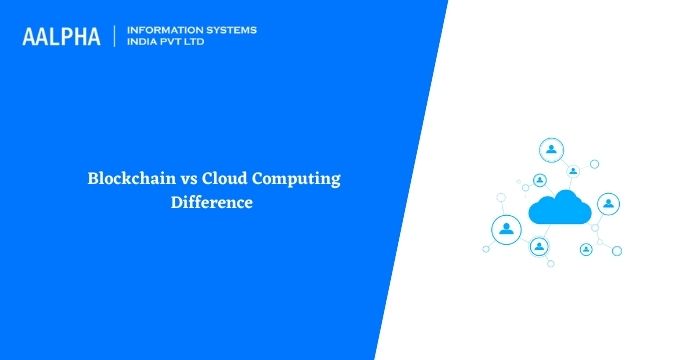Cloud computing and blockchain technology are the two on-demand technologies that are flourishing in the present industry and are used by businesses throughout the globe. One distinction is that blockchain technology’s ledger database records are immutable, while cloud storage data is not.
Now, this may sound not very easy. This article will provide in-depth guidance on the distinction between the two. You will study how issues such as blockchain technology and cloud computing are altering the technological landscape.
The introduction and development of cloud technology and blockchain have transformed software development, data storage, and online commerce.
What is Blockchain technology?
The blockchain platform and technology are developments with worldwide recognition. It connects people regardless of their actual location via its network. A person on one half of the globe may efficiently do business with a person on the other side.
Because a centralized authority does not manage blockchain, the processing of payments over a blockchain network is much quicker than any other method. To perform transactions on the blockchain, users do not need third-party authorization.
The blockchain system integrates technology for immutable distributed ledgers. Consequently, once data has been put into the ledger, it cannot be altered. Moreover, blockchain offers exceptional dependability since its immutable data and consumers may trace data back to its source.
What are Cloud Services?
Cloud computing is the Internet-based, pay-as-you-go delivery of computer resources, such as Software, memory, and processing power.
Instead of owning their computer hardware or data centres, organizations may rent access to applications and storage from a cloud provider.
The most significant aspect of cloud computing is its constant evolution and improvement. Because they operate on a global network, developers have invested time and effort to provide the most current enhancements, including faster and more dependable processing software and hardware. Cloud computing tries, in general, to increase program scalability while decreasing network latency.
Cloud computing is rapidly becoming the conventional option for many programs: as they shift to a monthly subscription model, software manufacturers are increasingly delivering their applications as internet-based services instead of standalone products. However, there may be a downside to cloud computing in that it may incur extra costs and risks for firms that use it.
What is the difference between them?
Now that you understand the essential components of cloud computing and blockchain and how they might function together, it is time to examine their contracts. Cloud computing is a very centralized approach, but blockchain and its powered platforms are entirely decentralized.
A further distinction is that cloud services make it easy to store and access anything online, but blockchain employs various forms of encryption to store data in secured databases. Cloud-based data is modifiable, but blockchain data is immutable.
Cloud may provide services of several kinds. You may be familiar with Platform as a Service (PaaS), Software as a Service (SaaS), and even Infrastructure as a Service (IaaS) (IaaS). The cloud does not ensure complete data integrity or that the data will be unaltered. And blockchain allows for this.
If you want to create blockchain-powered enterprise software, cloud computing may help you reach your goals and carry out your plans. It will store all data in your organization’s data centre. However, blockchain technology will still need to maintain its guiding principles and data openness.
Distinctive Features of Blockchain and Cloud Computing
- Blockchain is a secure technology that keeps data in encrypted databases using a variety of encryption and hashing algorithms. In contrast, we may reach a cloud using the internet. We may get information online through cyberspace.
- Since it is a digital ledger, blockchain does not provide any services. In the meanwhile, cloud computing offers services in three primary formats: (SaaS), (IaaS), & (PaaS).
- Data in the category of blockchain records is irreversible, but cloud computing data is modifiable.
- The blockchain prevents data tampering without depending on a centralized authority recognized by a third party, but the cloud does not ensure complete security or encrypted data.
- Blockchain is founded on decentralization, which means that it does not store any of its data in a single place. In contrast, cloud computing has a centralized data retrieval structure.
- Data accessibility is one of the most essential components of blockchain technology. Data may be public or private in cloud computing, meaning it can be seen by or disguised by other users.
- Blockchain technology is used by projects such as Ethereum, Bitcoin, Hyperledger Fabric, and Quorum, while Amazon Web Services (AWS), Google, Microsoft, and IBM provide cloud computing services.
Conclusion
Blockchain and cloud computing are two of the most recognizable developments. Both are providing companies with previously unavailable services. Blockchain has gained popularity due to its innovative and promising technology. It reduces the risk associated with every technology transaction, avoids fraud, and offers scalable transparency for various objectives. Cloud computing services provide for resource adaptability, rapid innovation, and scalability. Organizations and businesses are ditching traditional computer architecture in favour of cloud computing.
Contact us today and get more information from our experts!
